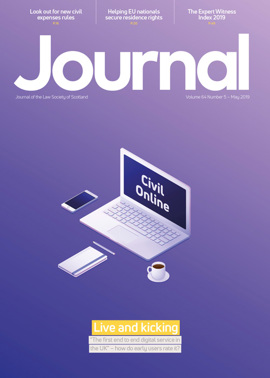Westminster: answering the call

Innes & Mackay is a medium-sized firm based in Inverness, with our practice focusing primarily on family law, private client and conveyancing. We were approached by the Parliamentary Review to contribute an article for its 2019 publication, which was a great honour, especially given that we were the only firm in Scotland to feature.
The Parliamentary Review is a guide to industry best practice which demonstrates how different sectors, including the legal sector, have responded to challenges in the political and economic environment. The editors asked us to address how any recent changes to legislation had impacted on us as a firm, and what challenges we have faced over recent years and months. While some of the firms featured focused on Brexit, the obvious changes for us to focus on were compliance with the General Data Protection Regulation 2018 and the Money Laundering Regulations 2017.
GDPR: keeping it in-house
The implementation of the GDPR as of 25 May 2018 brought with it some motivating challenges. Compliance has required significant investment by our firm, not only financially but also in time through education and training.
We took a decision at the outset to manage our GDPR compliance in-house. As a firm led by a team of six directors with 30 employees, we decided that one director would be responsible for researching the GDPR and then drafting a policy document before carrying out firm-wide training. Given the complexity and length of the GDPR, this was a time-consuming exercise. Thereafter the drafting of the policy and preparation of training material was, likewise, onerous. While initial training was provided in-house by that director to all fellow directors and colleagues, this was, and continues to be, followed up by regular update training sessions focusing on specific issues encountered over the intervening months.
The benefit of keeping this in-house is that we are equipped to deal with any GDPR issues immediately, without recourse to external advisers. The purchase of secure office equipment, hardware, and enhancing our computing software has cost the firm financially, but we consider this to be an investment worth making, not only to comply but genuinely to protect and reassure our clients. We have embraced the opportunity brought by the GDPR to enhance our security, and an unexpected benefit has been smarter working within our own team. We believe that we are as secure as we reasonably can be.
AML: assessing exposure
The first stage in anti-money laundering for all firms is preparing the risk assessment. For us this was a thought-provoking exercise and resulted in our determining that the firm was designed as low to medium risk. With residential conveyancing comprising a third of our firm’s business, this was an area of particular focus when we considered our money laundering exposure. This was followed by the drafting of a policy document, and then delivery of training sessions to all colleagues in the firm.
As a firm we have worked together, and our AML forms/new client information and source of wealth documents have evolved over the months as we have encountered new issues and concerns. In our training to colleagues we have impressed on them the importance of communicating with each other in the event that a suspicion arises and of then immediately referring that suspicion, however slight, to our MLRO. We have so far resisted the temptation to outsource our AML checks, deciding instead to keep this compliance in-house, which has the benefit of keeping our colleagues always thinking about and sharing information quickly regarding these important issues.
Time to reflect
On 20 March we attended an evening gala reception of the Review at Mansion House in London. At an unprecedented time in British politics it was interesting to meet other representatives from across the UK and listen to their experiences. The BBC’s political correspondent Andrew Neil delivered an insightful message regarding Brexit and its potential impact on British businesses.
The drafting of our Parliamentary Review article has given us cause to pause and reflect on our approach to compliance. Having provided a firm foundation with regard to compliance in these areas internally, our policies and procedures will continue to evolve and strengthen over the coming months and years.
Our advice to colleagues in other firms similar to ours is to educate yourselves as much as possible with regard to these important issues, before embarking on regular and rigorous in-house training to colleagues. In doing so we are confident that you, like us, will continue to provide a secure and professional service to your clients.
In this issue
- Claiming under the advance payment scheme
- Time for a written constitution
- New form F9: worth the wait?
- Wedded to a matrimonial property regime
- Brexit divorce set to increase UK's “skype families”
- Corporate personality: Justice v Doctrine
- Reading for pleasure
- The Law Society of Scotland Expert Witness Index 2019
- Opinion: Judith Robertson
- Book reviews
- Profile: Michael Clancy
- President's column
- Is your legal data being held to ransom?
- People on the move
- Sign up – log in – action!
- Frozen out?
- Taxing times for litigators
- DNA analysis: when research just isn’t enough
- Brexit focus: EU citizen settlement remedies
- Why employers should report on wellbeing
- 3% – and then what?
- 1,000 days of mediation
- Barred from acting
- To name or not to name?
- Enter the “What I Think”
- Fixed penalties and fair trials
- Auto-enrolment: keeping employers on their toes
- Scottish Solicitors' Discipline Tribunal
- Vulnerable accused: a need for knowledge
- Burdens and who can enforce them
- Convener’s final bow
- Public policy highlights
- TCSP review update
- Westminster: answering the call
- Accredited paralegal practice area highlight: family law
- Accredited Paralegal Committee profile
- Nyona named star paralegal
- Ask Ash
- Moving nightmares part 2
- Complaints: seeking consistent practice
- Morally bankrupt?
- For the elderly: how SFE works
- Standing up to challenge






